Supply Chain Insights
A collection of the latest logistics and supply chain management industry whitepapers, eBooks, case studies and more.
FILTER BY CATEGORY
- 3PL
- 4PL & LLP
- Automation
- Barcode & RFID
- Bulk
- Canada Logistics
- Chemical Logistics
- Cold Chain Logistics
- Customs Compliance & Duty Drawback
- Data Analytics
- Data Management
- Demand Planning & Forecasting
- Distribution Center Management
- Drayage
- E-Commerce
- Education
- Finance
- Fleet Management
- Food Logistics
- Freight Forwarding
- Freight Payment, Audit & Billing
- Fulfillment / eFulfillment
- Global Logistics
- Global Trade
- HazMat
- Intermodal
- Labor Management
- Last Mile / Final Mile
- Lift Trucks / Forklifts
- Logistics IT
- Materials Handling
- Moisture & Temperature Control
- Ocean
- Package Delivery
- Packaging
- Parcel
- Ports
- Printers & Labels
- Rail
- Real Estate
- Refrigerated Warehousing
- Retail
- Retail Logistics
- Reverse Logistics
- Risk Management
- Robotics
- Routing, Scheduling & Shipping Technology
- Security Solutions
- Site Selection
- Small Package Services
- Sourcing & Negotiations
- Supply Chain Execution
- Supply Chain Management & Optimization
- Supply Chain Mgmt/Optimization
- Sustainability
- TMS
- Transportation
- Transportation & Freight Management
- Trucking
- Trucking-LTL
- Trucking-TL
- Vendor Compliance
- Visibility
- Warehousing
- Wireless/Mobile Technology
- WMS
- Yard Management

Find the Money: How a Transportation Spend Diagram Can Help
Transportation leaders are constantly looking for ways to reduce costs while improving service levels as they conduct strategic assessments. Using the Spend Diagram to document freight flows and costs on a single page is the best way for a transportation team to collect data and focus their efforts. Read our white paper to learn how a Spend Diagram can identify savings opportunities throughout your transportation operations.

Preventing Product Recalls With Proper Planning and Equipment
This whitepaper informs manufacturers of the reasons and potential costs of product recalls. It details how these can be avoided and offers guidance on choosing the best solutions that can be incorporated into your product quality control programs. The whitepaper addresses five main questions: What does a recall cost? What are the main reasons for recalls? How do you control the controllable? What is the best practice to minimize recalls? What do you need to research?
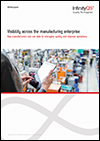
Visibility Across the Manufacturing Enterprise
Despite recent advancements in manufacturing technology and data management, many manufacturers still use antiquated data systems that store quality data on site at individual plants. While these systems might help to make improvements at a local level, they create data silos, preventing manufacturers from looking across their operations to find opportunities for global improvement. In this whitepaper, InfinityQS advises manufacturers to unify plant-level quality data to attain enterprise visibility. Organizations can use strong quality software and apply new data collection practices and modern analytics to unify disparate data streams and drive sophisticated analyses and improvements across their whole enterprise.
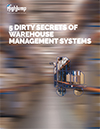
5 Dirty Secrets of Warehouse Management Systems
It’s a fact: most best-of-breed warehouse management system (WMS) providers force you to pay every time you require a system change. Uncover five more dirty secrets many warehouse management systems don’t want you to know. Download this whitepaper to discover these hidden truths and gain valuable information on considerations for evaluating WMS vendors. Arm yourself with information that will enable you to select a system that will fulfill your requirements today and years from now as your company grows–all at a low total cost of ownership.
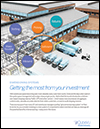
Dimensioning Systems: Getting the Most from Your Investment
As of Jan. 8, 2017, the cost of shipping most packages is now based on their dimensions, not just their weight. Size matters, now more than ever. Without the tools to dimension inbound and outbound parcels, many shippers and warehouses will find themselves at the mercy of their carriers–unable to predict or control costs, or even to audit their invoices. This whitepaper offers a crash course for people who need to start thinking about dimensioning solutions and don’t know where to start.
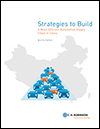
Strategies to Build a More Efficient Automotive Supply Chain in China
China represents tremendous opportunities for automakers and the companies that serve them. There are specific qualities that companies should seek in a qualified logistics provider to grasp their best opportunities. This whitepaper explains the top logistics challenges for the automotive industry in China, and how logistics providers can support automotive companies in China.
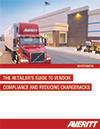
The Retailer’s Guide to Vendor Compliance and Reducing Chargebacks
With increasing demands from retail buyers, this whitepaper is aimed at providing tips and best practices that shippers can utilize to help avoid delivery and compliance mishaps. You’ll learn several key practices that you can put into action immediately to help boost your ability to meet your retail vendor’s compliance requirements. From coordinating warehousing and production to knowing what to ask of your carrier, become empowered to ship retail without the worry of incurring costly chargebacks and fees.

3 Keys of Direct-to-Consumer Success
What are the three keys to direct-to-consumer success, and why do they matter? Download this whitepaper now to discover: How the three keys work together to help you deliver a great brand experience, from online to on-time delivery; the two most inportant questions you should ask your 3PL about how it manages your online orders; the two essential qualities your 3PL must have to ensure same-day fulfillment of every order; and the single most important tool your 3PL needs to select the most cost-effective shipping method for on-time delivery.
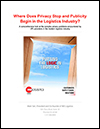
Where Does Privacy Stop and Publicity Begin in the Logistics Industry?
A comprehensive look at the complex privacy problems encountered by 3PL providers in the modern logistics industry. While 3PLs search for ways to stand apart from their competition using content marketing and social media, this can present serious privacy concerns for 3PLs and their customers. As such, 3PLs must maintain customer confidentiality when sharing customer focused content across all marketing platforms.
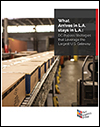
What Arrives in L.A. Stays in L.A.: DC Bypass Strategies that Leverage the Largest U.S. Gateway
Centralized distribution can be inefficient and costly for West Coast fulfillment. A well-planned DC bypass strategy can reduce transportation and inventory carrying costs, increase speed to market, delay allocations and take pressure off existing customer distribution centers. With the help of a 3PL, retailers and manufacturers can create a customized DC bypass strategy that supports growth and addresses the increasing time-sensitivity of customer deliveries.
Building the Smarter Warehouse: Warehousing 2020
How do today’s warehousing managers plan to capitalize on tomorrow’s unprecedented eCommerce opportunities? A recent global survey of over 1300 IT and operations warehouse professionals explores just that. Respondents divulge current practices as well as plans for the year 2020, offering unique insight and perspective into the trends that will shape the landscape of warehousing as we know it. Download this white paper for a detailed analysis of the survey’s findings.
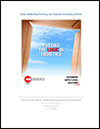
How Leadership Training can Improve Company Culture
Investments in training, particularly at the leadership level, are scarcely made in organizations. Implementing a training and development program that focuses on developing and empowering an organization of leaders reinforces a positive company culture that will pay dividends for years to come.

Examination of on-time delivery service in a JIT environment
Adopting just-in-time (JIT) inventory principles has enhanced production operational efficiency, cost effectiveness and customer responsiveness for many organizations. But the real key to success is providing a solution that applies JIT principles to the specifics of each client’s industry and accurately tracks and delivers on-time performance, regardless of industry conditions, leading to the greatest competitive advantage.
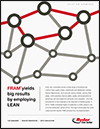
Ryder and FRAM: Filtering waste for the supply chain
Being the number one oil filter brand in America, FRAM knows having waste in your engine leads to poor performance. Being a supply chain logistics industry leader, Ryder knows having waste in your supply chain can also lead to poor performance. By collaborating with Ryder, FRAM was able to filter out waste from its supply chain, leading to more efficient processes and cost savings. The results include 100 percent productivity increase, 99.8 percent pick accuracy, and a seven-figure reduction in annual distribution costs.
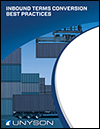
Inbound Terms Conversion Best Practices
Many companies remain unaware of just how much their inbound freight costs them because these charges are “buried” in the prices they pay for the goods. “Collect” payment terms allow companies to pay for their own inbound transportation costs rather than their vendors . This not only gives a company greater control over their network—often resulting in greater visibility, tracking, and monitoring—but is frequently more cost-effective as well.
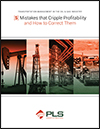
Oil and Gas Transportation Mistakes and How to Correct Them
Historically, O&G companies’ soaring profits masked the poor state of logistics operations within their supply chains. Now that profits are thin, they’re rushing to save money wherever they can. O&G companies realize the savings potential in their disordered logistics processes, specifically in transportation management. Many businesses are making the same mistakes over and over, despite the fact that they can be easily avoided.

Don’t Forget About The Most Important Link In The Supply Chain.
Last mile deliveries comes with a slew of logistical challenges, but many companies often forget to think of the most important link in the supply chain ñ the end-customer. In todayís on- demand environment, customers want to have full visibility over their deliveries, as well as an open line of communication with both the business itself and the person making the delivery.
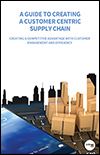
Guide to Creating a Customer Centric Supply Chain
We’ve entered a new age – the age of the empowered consumer. In this environment, there are new expectations and operational requirements of enterprise businesses that deliver – such as package and parcel services and restaurant chains – that must be met in order to stay competitive. Creating a Customer Centric Supply chain can be a tricky thing; while each business has its own operational needs, there are a few concepts that are relatively universal.

Global Forwarding: Biggest, Fastest Savings
It’s mission critical to optimize efficiencies and savings while moving freight around the world. Where can you get the biggest savings in international shipping with the least effort? Start here, by reading this new white paper detailing: How to get more use out of available space with cargo consolidation; How to estimate exposure and manage cargo risk; Why understanding Incoterms®, free trade agreements, and ACE may lead to savings and efficiency improvements, and more.

Examination of an Inbound Web Portal
Regardless of the size of a business, everyone is looking to save money and streamline processes. However, often companies overlook the cost of their supply chain, particularly their inbound transportation. Inbound web portals have the ability to bring several companies together in one place to share accurate and necessary information and provide an opportunity for business-to-business growth. Overall, each component of the supply chain—whether it is customers, 3PL providers, carriers or vendors—can reap the rewards of reduced costs, advanced visibility, improved reliability and increased savings.
Five Ways a TMS Solution Adds Value to Any Shipping Organization
The business case for supply chain logistics software is compelling to every stakeholder if properly communicated. Download this complimentary eBook which provides five iron-clad arguments in favor of implementing a TMS platform with optimizer tools and private fleet management capabilities. Use these simple, yet effective arguments to build a winning business case for TMS in your organization.
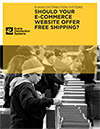
Should Your E-Commerce Website Offer Free Shipping?
As much as people enjoy the convenience of being able to shop online, most don’t want to wait long or spend much to get their goods delivered. Amazon and other big box retailers have created an environment where free, quick shipping is now the norm. Shipping is a factor for any online retailer, and approaching it in the wrong way may end up costing you.
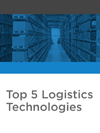
Top 5 Logistics Technologies
The business of Logistics is evolving. While there are a lot of supply chain innovations that have made a big impact on the business of logistics over the years, here are five recent innovations that are revolutionizing the industry: Robotics & Automation; Advanced Inventory Tracking Technologies; Advanced Inventory Management Systems; Collaborative Logistics; Supply Chain Design & Modeling Tools.
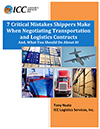
7 Critical Mistakes Shippers Make When Negotiating Transportation and Logistics Contracts
Master the fine art of negotiating transportation and logistics contracts. Download this whitepaper to learn the seven critical mistakes shippers make and how to avoid them. Do it right and you can create a strong strategic alliance that will yield financial rewards and exceptional service and support for the long term.
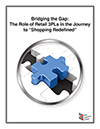
Bridging the Gap: The Role of Retail 3PLs in the Journey to “Shopping Redefined”
Are you omni-channel ready? Learn why retail 3PLs are uniquely positioned to help retailers bridge the gap to an omni-channel shopping environment with their expertise in these key capabilities: inventory visibility; optimized fulfillment; and perfect packing.

The Engagement Stack
This extensive whitepaper looks at how brands can effectively utilize their data and technology to engage with customers. The author, Dr. Phil Hendrix, managing director at immr, delves into the seven characteristics that distinguish masters of engagement; case studies with Starbucks, Patagonia and Sephora; and much more. Hendrix also examines the “regret test” by asking: “If your company disappeared today, would anyone really care in six months? Would you be sincerely missed and difficult to replace or would your customers move on to the next thing? Download this free resource to identify how your company can become a “master of engagement.”
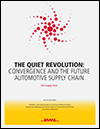
Quiet Revolution: Convergence and the Future Automotive Supply Chain
The century-old way of doing business in the automotive industry is now over. The industry is facing a revolutionary convergence with the technology sector that will transform how it manages its supply chain operations. This whitepaper reveals that the increasingly high-tech composition of vehicles, driven by growing consumer expectation of product innovation, is propelling this convergence between the two industries. Download your free copy for additional details.
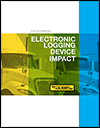
Electronic Logging Device Impact
The Federal Motor Carrier Safety Administration (FMCSA) passed a regulation in December 2015 that requires all commercial trucks and buses manufactured after 2000 to be equipped with an electronic logging device (ELD). An estimated three million drivers who currently use paper logs will have to convert to a digital log. This may affect HOS compliance and carrier capacity. This executive briefing offers more information about this mandate and how it affects the industry.
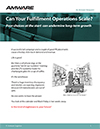
Can Your Fulfillment Operations Scale?
Growing companies don’t think far enough ahead about the implications of growth on fulfillment operations. But that lack of planning can backfire if the sales engine outpaces the company’s ability to fulfill orders. Fast-growing companies would benefit from a scalable, outsourced solution where space, automation and labor adapt to growth requirements, where risk is mitigated, and where distribution costs parallel revenue. Read the eBook.

Wide Open: How the Panama Canal Expansion is Redrawing the Logistics Map
How will the Panama Canal expansion in 2016 impact logistics? You’ll find the answers in this new whitepaper, published by C.H. Robinson in collaboration with Boston Consulting Group. Among the paper’s conclusions: The expansion could shift 10 percent of container traffic between East Asia and the United States from West Coast ports to East Coast ports; the battleground on which U.S. ports compete for customers will move several hundred miles west, to a region that accounts for more than 15 percent of GDP; and shippers and carriers will have to adapt their strategies and operations as logistics grow more complex.
A Quick Guide to High-Performing Partner Portals
Are your supply chain partners passionate about your partner portal? It’s essential that they are if you want to generate loyalty and increase sales. Your portal is the go-to source for most of your channel partner contact and information, so it needs to provide first-class support, tailoring partner experience to need, avoiding confusion and eliminating frustration. Download this quick guide, which provides best practices for building a successful partner portal.
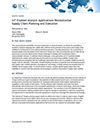
IoT-Enabled Analytic Applications Revolutionize Supply Chain Planning and Execution
The Internet of Things (IoT) will "deliver on the promise of true end-to-end supply chain visibility for the first time," reports IDC in this new whitepaper. Want to know how? Download this free resource to learn why milestone-based visibility solutions are no longer acceptable in today’s competitive marketplace; how the IoT will impact supply chains with new solutions that provide unprecedented visibility; and why businesses should focus purchasing on "purpose-built applications" rather than toolkits.
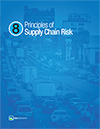
8 Principles of Supply Chain Risk Management
It is impossible to completely eliminate risk from your supply chain, but you can minimize exposure to risk with careful planning, tools, and processes to anticipate and manage risk more effectively. This free whitepaper is an accumulation of experiences documented to help guide companies as they mature their supply chain risk management program and make changes to proactively respond to and minimize the impact of risk events. Download this whitepaper to gain new insights into supply chain risk management.
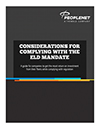
Considerations for Complying With the ELD Mandate
Learn how to get the most return on investment from your fleet while also abiding by the Federal Motor Carrier Safety Administration’s new mandate requiring the use of Electronic Logging Devices (ELDs) to log drivers’ record of duty status. This whitepaper explores what the mandate entails, and the features and functions of ELDs. It also includes advice on how to successfully implement these devices into your existing systems.
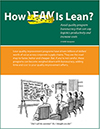
How Lean is Lean?
Lean quality improvement programs have driven billions of dollars’ worth of value across corporate supply chains. But, if you’re not careful, these programs can become weighed down with bureaucracy, adding time and cost to your quality improvement efforts. This eBook reviews practical ways to make sure Lean program management doesn’t get in the way of getting the work done.
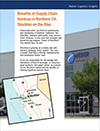
Benefits of Supply Chain Services in Northern CA: Stockton on the Rise
Warehousing and distribution in Northern CA was historically centered in the East Bay area. Many are turning inland to Stockton for their supply chain needs. If you are responsible for the storage and distribution of food and beverage or consumer goods products, this paper serves as a primer on the Stockton market and the benefits of utilizing logistical services there.

Dimensional Weight: Don’t Let It Weigh You Down
Dim weight pricing changes do not have to weigh heavily on manufacturers and retailers from a financial or operational perspective. By taking the proactive steps outlined in this whitepaper, companies can help ensure they are protecting their customers’ products, their reputations, and their bottom lines.
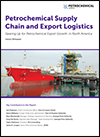
Gearing Up For Petrochemical Export Growth in North America
With plastics export set to triple in the United States by 2020, petrochemical producers need additional storage and transportation capacity to accommodate this growth. This whitepaper offers in-depth analysis into additional storage capacity needed along the supply chain and at ports, and how producers plan to collaborate with stakeholders across the supply chain. It also provides tangible solutions to help companies overcome pressing issues such as storage and transportation capacity, and new infrastructure requirements.

The True Cost of Ownership for Counterbalance Forklifts: Understanding the Impact of Hidden Costs
Counterbalance forklift owners seeking to best manage their industrial equipment investment will find this new whitepaper very helpful. It explores how performance and durability, service and maintenance, and ergonomics can impact overall expenses; and illustrates how important it is to take a more comprehensive approach to understanding the true cost of ownership for counterbalance forklifts.
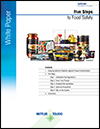
Five Steps to Food Safety
The safety and quality of food have always been important. With recent reports of contamination on the rise, however, it is more vital than ever that food and pharmaceutical manufacturers are equipped with top-quality product inspection equipment. This whitepaper provides food and pharma companies with a five-point checklist to ensure optimal protection against foreign body contaminiation. Topics include understanding regulations, knowing your product, boosting risk awareness, optimizing productivity, and relying on the experts.

Changing Metrics – and Mindsets – in the Warehouse
Forklift connectivity provides the visibility to manage fleets for greater safety and productivity, and is a key building block of the connected warehouse of the future. This three-part whitepaper series captures the technology adoption best practices Crown’s team has observed and implemented in diverse materials handling applications. The purpose of the series is to help accelerate forklift fleet management adoption and prepare the industry for more complex technology initiatives.

How to Reduce Chargebacks in Your Vendor Compliance Program
Retailer chargeback penalties for non-compliant shipments are a profit-draining reality for many consumer goods manufacturers. Companies with the will and the resources to prevent and refute chargebacks can avoid hundreds of thousands, even millions, in lost profit. This paper provides background on the origins and rationale for chargebacks, followed by a 7-step process for avoiding or overturning these costly penalties.

Transportation Trends and Insights
Each month, Penske publishes Transportation Insights–articles designed to inform and enlighten those in the transportation industry. Our downloadable e-book is a collection of some of our best recent Insights, centered on the topics of talent shortage, driver health and well-being, and safety and compliance. Each piece features information from industry insiders or thought leaders, and offers relevant information on some of the key areas that impact your business the most.
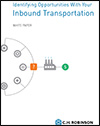
Identifying Opportunities With Your Inbound Transportation
An efficient inbound transportation program can reduce costs, improve service, minimize delays, reduce confusion, and raise performance. Get the whitepaper today and learn where you can find savings and eliminate gaps in your inbound program.
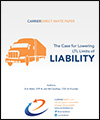
The Case for Lowering LTL Limits of Liability
This publication illustrates why it is in the best interest of third-party logistics providers to work with carriers and reduce limits of liability to $1 per pound in the LTL arena. It also describes the key points that cast 3PLs in a favorable light to ultimately forge stronger, more strategic partnerships with LTL carriers. Delivering an analysis of effective procedures for partnership, this whitepaper outlines specific strategies 3PLs can use to better serve carriers by identifying and working to solve the issues that complicate the existing liability landscape.
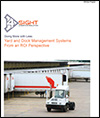
Doing More With Less: Yard and Dock Management Software ROI
This whitepaper provides an important analysis for anyone faced with logistics problems in the yard or at the dock, including high operational and labor costs, inefficient processes, security, and other serious issues. It features an overview of several yard management and dock management software solutions and approaches that not only solve the problems facing on-site logistics operations, but ensure timely ROI using a proven and automated "less is more" approach.
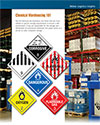
Chemical Warehousing 101
Not all chemicals are hazardous, but those that are must adhere to specific storage requirements. If you are responsible for the storage and distribution of commercial chemicals, this paper serves as a primer on safe, compliant storage. This guide shares what determines classification, the requirements of hazardous materials and provides steps to assess the capabilities of a commercial warehousing partner.

Green Freight Handbook
Environmental Defense Fund (EDF) has released its Green Freight Handbook – an easy-to-use guide to making changes that cut emissions and save logistics costs. This free guide can help you understand why green freight practices have become essential for controlling greenhouse gas emissions; establish metrics and measure program success; assess the best opportunities to drive down costs and greenhouse gas emissions; and gain support for initiatives and implement with success.
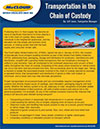
Transportation in the Chain of Custody
Pest infestations while processed foods and raw commmodies are transported are more likely to increase during summer months, which can directly impact food quality and consumer health. Proper transportation of food items is often overlooked, and transportation directly impacts issues such as spoilage, pest infestation, packing integrity, and food quality. Download this free whitepaper to learn proper prevention methods, create a plan to predict pending problems, act swiftly when an issue does arise, have efficient routing systems in place, manage inventories to eliminate surplus, and prevent historical challenges.

Understanding New Food Labeling Regulations
With the release of an overhaul to the BRC Issue 7 Food Safety guidelines, as well as further changes on the horizon for the EU and the United States, Mettler Toledo has compiled all the latest regulations in an easy-to-understand guide that goes through each set of regulations in detail. In addition to giving manufacturers a handy reference tool, this whitepaper also forecasts developments on the horizon, and recommends the best way to ensure compliance with labeling regulations moving forward.
